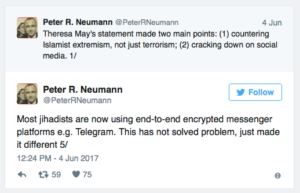
Tech firms: We’re trying to make our sites hostile to terrorists
by KELLY FIVEASH original published on arstechnica.com
Facebook, Twitter, and Google react to UK prime minister’s call to limit encryption
In the aftermath of the London attack, Facebook, Google, and Twitter have insisted that they already work closely with the UK government to flush out the sharing of extremist content—as fresh calls to crack down on the Internet and end-to-end crypto once again surfaced following a terror atrocity.
It comes after prime minister Theresa May said on Sunday that terrorist ideology has a “safe space” online, and—on a day when campaigning for the general election was supposedly suspended—she trotted out many of the political pledges in the Tory manifesto, just 12 hours after the attacks in London Bridge and Borough Market took place.
Chief among those vows that are likely to worry tech firms, some of which offer services that come loaded with end-to-end encryption, was the PM’s call for the regulation of “cyberspace to prevent the spread of extremist terrorism planning.”
Three men deliberately drove a hire van into pedestrians on London Bridge on Saturday night. They then went on a knife-wielding rampage through nearby Borough Market, targeting anyone in their path. Armed police were on the scene and killed the men within eight minutes of the start of the attack.
In her speech on Sunday, May—who flagged up four areas of concern relating to both the online and offline world—said: “We cannot allow this ideology the safe space it needs to breed. Yet that is precisely what the Internet and the big companies that provide Internet-based services provide.”
However, Facebook disputed the claim that free content ad networks were a breeding ground for terrorists. The company’s policy director, Simon Milner, said:
We want to provide a service where people feel safe. That means we do not allow groups or people that engage in terrorist activity, or posts that express support for terrorism. We want Facebook to be a hostile environment for terrorists.
Using a combination of technology and human review, we work aggressively to remove terrorist content from our platform as soon as we become aware of it—and if we become aware of an emergency involving imminent harm to someone’s safety, we notify law enforcement.
Online extremism can only be tackled with strong partnerships. We have long collaborated with policymakers, civil society, and others in the tech industry, and we are committed to continuing this important work together.
Twitter’s public policy head, Nick Pickles, echoed Facebook’s statement. “Terrorist content has no place on Twitter,” he said.
“We continue to expand the use of technology as part of a systematic approach to removing this type of content. We will never stop working to stay one step ahead and will continue to engage with our partners across industry, government, civil society, and academia.”
Google agreed. “We are committed to working in partnership with the government and NGOs to tackle these challenging and complex problems, and share the government’s commitment to ensuring terrorists do not have a voice online,” it said.
“We are already working with industry colleagues on an international forum to accelerate and strengthen our existing work in this area. We employ thousands of people and invest hundreds of millions of pounds to fight abuse on our platforms and ensure we are part of the solution to addressing these challenges.”

May claimed on Sunday that “enough is enough” when it comes to dealing with terrorism and extremism in the UK—policy areas that she was directly responsible for during her six-year long stint as home secretary.
“Putting in place the right solutions to combating the misuse of online platforms is just one part of the jigsaw in tacking extremism,” said Anthony Walker, deputy chief of industry body techUK. “These are highly complex, challenging issues and tech companies are committed to playing their part, working within a clear legal framework and in full recognition of the seriousness of these issues.”
The Internet Services Providers’ Association—a lobby group which represents many of Britain’s teclos including BT, Sky, and Virgin Media—told Ars that the “government and the security services already have substantial powers in this area and the Internet industry complies with the laws and regulations in the UK and elsewhere.” It added:
When considering the need for more powers to regulate the Internet, policymakers need to be fully aware of the effectiveness of existing powers, resources to deal with the threat and the impact any new measures may have, including unintended consequences that could undermine our defences—for instance the weakening of cyber security.
Technology is only one part of the wider approach to dealing with radicalisation, which is an complex international challenge that requires an international response.




